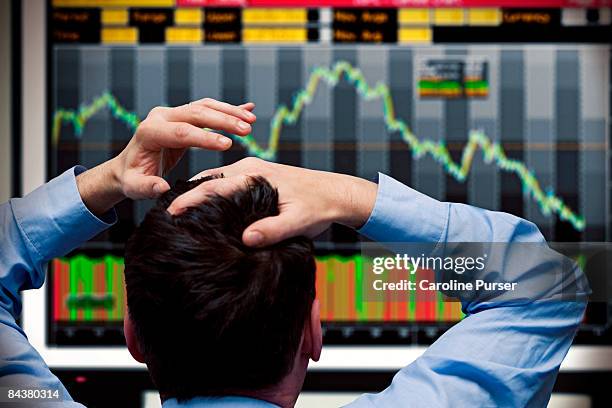Global Markets Tread Water After Wall Street’s Brief Respite
Global equity markets displayed a mixed performance as investors digested a brief rally in U.S. stocks and weighed the continuing economic uncertainty that has marked much of 2024. After a week of subdued trading, Wall Street provided a short-term boost, with the S&P 500 closing the week up 1.1% on Friday. However, the relief proved fleeting as the index ultimately finished 2% lower for the week, highlighting the volatile and uncertain environment that has gripped markets across the world. As major economies struggle with inflation, interest rate hikes, and geopolitical tensions, global markets tread water after Wall Street’s brief respite, leaving many wondering whether the brief uptick is merely a blip in a much larger downturn.
This lack of sustained momentum is reflective of broader market dynamics where economic and geopolitical headwinds continue to play a pivotal role in shaping investor sentiment. Despite occasional flashes of optimism, the persistent uncertainty keeps investors on edge, unsure of where the markets are heading next. As global markets tread water after Wall Street’s brief respite, one thing is clear: the coming months are unlikely to offer any quick fixes for the myriad challenges facing the global economy.
- 1 Global Markets Tread Water After Wall Street’s Brief Respite: The U.S. Impact and Federal Reserve’s Tightening Policy
- 2 Global Markets Tread Water After Wall Street’s Brief Respite: Europe’s Struggles Amid Inflation and Energy Crisis
- 3 Global Markets Tread Water After Wall Street’s Brief Respite: Asian Markets Find Mixed Sentiment
- 4 Global Markets Tread Water After Wall Street’s Brief Respite: Geopolitical Risks and Political Uncertainty
- 5 Global Markets Tread Water After Wall Street’s Brief Respite: The Road Ahead
Global Markets Tread Water After Wall Street’s Brief Respite: The U.S. Impact and Federal Reserve’s Tightening Policy
In the United States, recent developments on Wall Street provided a reprieve, but global markets tread water after Wall Street’s brief respite as broader uncertainties remained. The modest gains in U.S. equities were largely driven by the passage of a long-awaited budget deal that prevented a government shutdown. This news offered a brief moment of optimism, but the joy was short-lived. While the passage of the budget deal averted an immediate crisis, it did little to address the fundamental economic challenges still looming large. U.S. markets, much like their global counterparts, remain caught between the conflicting forces of sluggish growth and rising inflation.
Central to this uncertainty is the Federal Reserve’s ongoing tightening of monetary policy. In response to persistently high inflation, the Fed has significantly raised interest rates, making borrowing more expensive and slowing down economic activity. Despite a slight cooling of inflation in recent data, concerns about the Federal Reserve’s stance on future rate hikes are still central to market sentiment. Global markets tread water after Wall Street’s brief respite, with investors anxiously awaiting the Fed’s next moves. While the S&P 500 saw a brief rally, the Federal Reserve’s signal of fewer interest rate cuts next year than previously anticipated cast a shadow over the recovery, raising questions about the sustainability of the rally.
For investors, the concern is clear: the Fed’s aggressive stance on inflation could prolong the economic slowdown and potentially lead to a deeper recession. The possibility of more interest rate hikes in the months ahead leaves markets teetering on the edge, with little clarity on when or how the U.S. economy might regain traction. Thus, as global markets tread water after Wall Street’s brief respite, the focus remains on the Federal Reserve’s actions, which will likely dictate the course of U.S. and global markets in the foreseeable future.
Global Markets Tread Water After Wall Street’s Brief Respite: Europe’s Struggles Amid Inflation and Energy Crisis
Across the Atlantic, Europe’s markets opened the week on a muted note, reflecting the broader global sentiment of caution. Germany’s DAX, France’s CAC 40, and the UK’s FTSE 100 all recorded slight declines, reflecting investors’ concerns about the region’s economic outlook. Global markets tread water after Wall Street’s brief respite as European economies continue to struggle with rising inflation, energy shortages, and geopolitical instability.
The ongoing energy crisis, exacerbated by the war in Ukraine, remains a significant drag on the Eurozone’s economic performance. As energy prices remain elevated, European businesses face higher operational costs, leading to slower growth and reduced consumer spending. Inflation, while slightly off its highs, continues to weigh on household budgets and economic sentiment. In response, the European Central Bank (ECB) has continued to raise interest rates, which has added to the pressure on European markets. Global markets tread water after Wall Street’s brief respite, as investors remain uncertain about how much more tightening the ECB will undertake, and whether it will be enough to curb inflation without pushing the region into a full-blown recession.
Europe’s economic recovery has been uneven, with some countries faring better than others. Germany, the region’s largest economy, has been particularly hard hit by the energy crisis and a slowdown in industrial production. The specter of stagflation—where inflation remains high, but growth stagnates—remains a concern, and European markets are unlikely to see a significant rebound until these structural issues are addressed. As global markets tread water after Wall Street’s brief respite, the Eurozone’s struggle to emerge from its economic malaise continues to cast a long shadow over investor confidence.
Global Markets Tread Water After Wall Street’s Brief Respite: Asian Markets Find Mixed Sentiment
In Asia, market performance has been more varied, with some regions showing optimism while others remain under pressure. Japan’s Nikkei 225 index rose by 1.2% on news that Honda Motor Co. and Nissan Motor Corp. were discussing a potential merger. This news was seen as a positive development for the Japanese automotive sector, which has faced its own set of challenges in recent years. Other Asian markets, including Hong Kong and South Korea, also recorded notable gains, but this positive momentum was far from universal across the region.
China, the world’s second-largest economy, remains a source of considerable concern. The Chinese economy has continued to show signs of slowing growth, with the real estate sector in particular facing significant headwinds. The country’s ongoing regulatory crackdown on major industries has added to investor unease, and geopolitical tensions between China and the U.S. have only added to the uncertainty. As global markets tread water after Wall Street’s brief respite, the outlook for Asia remains unclear. While some countries are benefiting from a post-pandemic economic recovery, China’s struggles and the broader geopolitical risks create a complex and challenging environment for investors.
The trade and technology tensions between the U.S. and China remain a key issue, with the potential for further decoupling between the two largest economies in the world. This has significant implications not just for the region, but for the entire global economy. As global markets tread water after Wall Street’s brief respite, these geopolitical factors continue to exert downward pressure on Asian markets, particularly those that are heavily reliant on Chinese trade and investment.

Global Markets Tread Water After Wall Street’s Brief Respite: Geopolitical Risks and Political Uncertainty
Geopolitical risks continue to weigh heavily on market sentiment, particularly as conflicts such as the war in Ukraine show no sign of resolution. As energy prices remain high and supply chains continue to be disrupted, the fallout from the war continues to ripple across global markets. In addition, the ongoing tensions between the U.S. and China, particularly in the technology sector, have introduced an additional layer of uncertainty.
Political uncertainty, particularly in the U.S., has also contributed to market volatility. With the 2024 presidential election approaching, investors are closely watching the potential impact of political shifts on the economy and financial markets. While the initial expectation was that a change in leadership could lead to pro-growth policies, concerns are mounting about the potential for increased trade protectionism and other policies that could disrupt global supply chains and exacerbate inflation.
As global markets tread water after Wall Street’s brief respite, these geopolitical and political risks are critical factors to watch. The continued uncertainty surrounding trade, energy, and international relations has made it increasingly difficult for investors to predict market movements with confidence. Political events, both in the U.S. and abroad, will likely continue to play a pivotal role in shaping the future trajectory of global markets.
Global Markets Tread Water After Wall Street’s Brief Respite: The Road Ahead
Looking forward, global markets tread water after Wall Street’s brief respite, and the path ahead remains fraught with challenges. As we approach the end of the year, the outlook for global markets is clouded by ongoing risks that show no signs of abating. Inflation remains a persistent concern, and while the Federal Reserve has shown some signs of easing its rate hikes, the risks of prolonged tightening remain.
The outlook for Europe remains equally uncertain, with the region continuing to grapple with high energy prices and the aftershocks of the war in Ukraine. For Asia, the picture is more complex, with some economies showing signs of recovery, while others remain mired in stagnation or decline. The geopolitical risks surrounding China, the U.S., and Europe continue to loom large, adding another layer of complexity to the global economic picture.
As global markets tread water after Wall Street’s brief respite, investors are left to navigate a landscape marked by economic fragility, political uncertainty, and geopolitical risks. The balance between inflation control, economic growth, and geopolitical stability will be crucial in determining the direction of markets in the coming months.
While the global economy remains resilient in some areas, the challenges it faces are numerous and complex. The path forward will likely be one of continued caution, with significant volatility along the way. As global markets tread water after Wall Street’s brief respite, the key question for investors is how to position themselves in such an uncertain environment. The coming months will likely be characterized by a combination of market volatility, shifting economic conditions, and evolving geopolitical tensions, making it all the more important for investors to stay informed and adaptable as they navigate these turbulent waters.
MacKenzie Scott Donates $2 Billion in 2024: A $19 Billion Testament to Generosity
Global Markets Tread Water After Wall Street’s Brief Respite: A Global Economic Tug-of-WarThe balance between inflation control, economic growth, and geopolitical stability will be crucial in determining the direction of markets in the coming months. While the global economy remains resilient in some areas, the challenges it faces are numerous and complex. The path forward will likely be one of continued caution, with significant volatility along the way. As global markets tread water after Wall Street’s brief respite, investors must carefully consider their positioning in this uncertain environment, characterized by market volatility, shifting economic conditions, and evolving geopolitical tensions. Stay informed and adaptable to navigate these turbulent waters effectively.
CHECK THIS ALSO “Party City Files for Bankruptcy: 700 Stores to Close as Retailer Winds Down Operations”









1 thought on “Global Markets Tread Water After Wall Street’s Brief Respite: A Global Economic Tug-of-War”